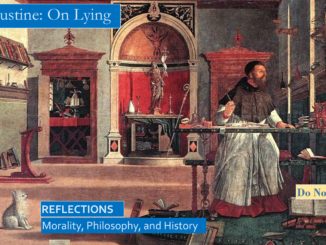
St Augustine: On Lying
St Augustine teaches us, “there is a difference between lying and being a liar. A man may tell a lie unwittingly; but a liar loves to lie, and inhabits in his mind the delight of lying.” […]

St Augustine teaches us, “there is a difference between lying and being a liar. A man may tell a lie unwittingly; but a liar loves to lie, and inhabits in his mind the delight of lying.” […]
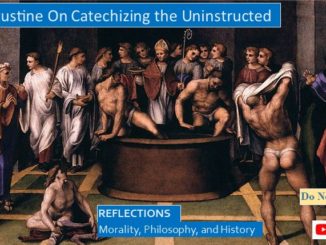
If you seek to become a Christian for social or temporal reasons you may backslide from the faith when you see “wicked and impious men” who are more prosperous than you are. You may ask yourself, How is this faith helping me? This is the wrong question, for the true Christian seeks “everlasting blessedness and the perpetual rest of the saints so he may not pass into eternal fire with the devil but rather enter into the Eternal Kingdom together with Christ. He will be on his guard in every temptation, so we will neither be corrupted by prosperity nor be utterly broken in spirit by adversity, but remain modest and temperate during good times, and be brave and patient during times of tribulation.” Then this Christian will “Love God more than he fears hell,” and he will recoil from evil thoughts and temptations. […]

In all his writings St Augustine reminds us that the core of our faith is the commands to Love God with all of our heart and with all of our soul and with all of our mind and with all of our strength, and to love our neighbor as ourselves. In this work on catechesis St Augustine teaches that the vice that ruins love, the vice that is the enemy of love is envy, and that the mother of envy is pride. This section is referenced in the Catholic Catechism teaching on the Commandment, Do Not Covet. […]
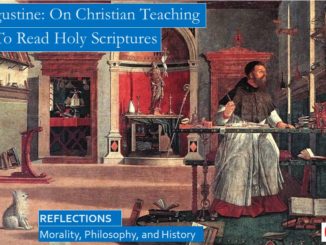
St Augustine teaches, “Whoever thinks he understands the Holy Scriptures, or any part of them, but interprets them in a way that does not build up this two-fold Love of God and love of neighbor, does not truly understand the Scriptures. If, on the other hand, a man draws a meaning from Scriptures that builds up the two-fold Love of God and love of his neighbor, although he does not precisely understand the exact meaning of the author, his error is not pernicious, and he is wholly clear from the charge of deception.” […]
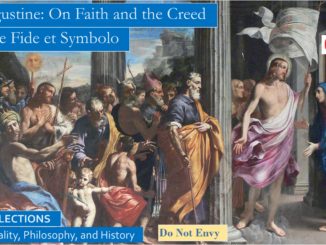
This discourse on the Apostle’s Creed was delivered by St Augustine to a local church council in North Africa. In this treatise he repeats his classical explanation of the Trinity:
The Father is truly God, the Son is truly God, and the Holy Spirit is truly God.
The Father is not sometimes the Son, and the Father is not sometimes the Holy Spirit, and God is One. We have God the Father, God the Son, and God the Holy Spirit, but “there are not three Gods in that Trinity, but One God and one substance.” […]
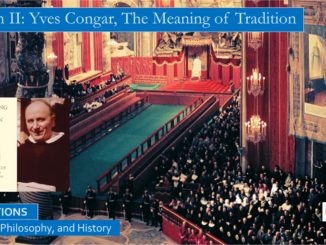
By abandoning diatribes, by abandoning the proclaiming of anathemas against those who disagree with Catholic doctrine, the post-Vatican II Catholic Church now explicitly believes that both Catholics and Protestants can both attain Salvation through the grace of God and His Son Jesus Christ. By opening a dialogue, the Church teaches we can learn from both Catholic and Protestant theologies, and this also infers that this encourages study, effort, and dedication. In the spirit of Vatican II, we should strive to view these as differences of emphasis rather than as differences that divide. […]

The cleric whose writings most influenced the decrees of Vatican II was Yves Congar, including his work on the Meaning of Tradition. He examined what the Church Fathers taught us about tradition throughout Church History, and as expected, since it was not hotly debated until the Reformation, there was a great many teachings on what tradition meant. […]
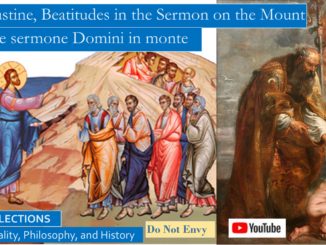
Why did Christ climb the mountain to preach to the people? St Augustine teaches us so Christ can teach us “greater precepts of righteousness,” righteousness not solely through fear, but righteousness that will “set us free by love.” […]
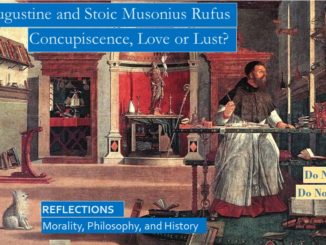
The church teaches that what gives marriage purpose is the bearing of children, so we do not live our lives for ourselves. Salvation is the purpose of marriage, the salvation of our children, the salvation of our spouse, and the working out of our salvation. How does the command to love our neighbor as ourselves work its way out in marriage? We should consider first the good of our children in the living of our lives, then we should work for the good of our spouse, and we should take care of ourselves, but we are last. But last of all in a marriage should be concupiscence, but we should not neglect loving kindness and tenderness, that should pervade all the relationships with our children and with our husband or wife. […]

St Augustine starts his discussion on “On the Good of Marriage” with a discussion how marriage is first a friendship in bonds of family, and a friendship between man and wife, friends who walk together, side by side, raising children, growing old together. St Augustine is a bit harsher in “Marriage and Concupiscence,” teaching that “in matrimony, let these nuptial blessings b the objects of our love – offspring, fidelity, the sacramental bond.” This sacramental bond is meant to be ever-enduring, “lost neither by divorce nor by adultery, and should be guarded by husband and wife with concord and charity.” […]
Copyright 2017